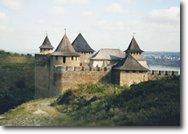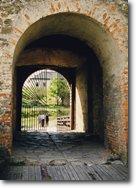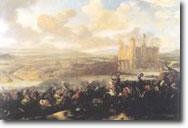| Khotyn (Chotyn)
| Khotyn was founded as a fortified settlement
on the cliffs high above the Dniester river. It became
an important trading centre due to its strategic position
as a river crossing. By the 13th century, the town is
reported to have become the site of a trading colony of
the Genoese, who would later build the famous castle that
was expanded by subsequent rulers. |
|
 |
 |
|
The ancient Kievan Rus settlement changed
hands frequently over the course of several hundred years
- occupied at various times by the Kingdom of Hungary,
Moldavia, Polish-Lithuanian Commonwealth, Russian Empire,
Austria and Romania, before reverting to the USSR in 1940
(interrupted briefly by the occupation of Nazi Germany
from 1941 to 1944), and eventually the newly independent
Ukraine in 1991. |
| In terms of historical significance, Chotyn
was the scene of a famous battle in 1621 in which a large
Ottoman force was resisted by the Commonwealth hetman
Jan Chodkiewicz. Three centuries later, the town was part
of territory annexed by Romania in 1919, an act that was
resisted by the town's ethnic Ukrainians. The rebellion,
which was ultimately quashed, became known as the Khotyn
Uprising - commemorated by a monument in Chernivtsi. |
|
 |
The fortress remains an impressive sight today, and is well
worth a visit. It can easily be reached on day trip from Chernivtsi,
including a detour to nearby Kamyanets-Podolskyy.
Location: 100 km southeast of Tovste (but closer
and easier to reach from Chernivtsi)
Source: Wikipedia,
last accessed on 8 September 2006. 
|

